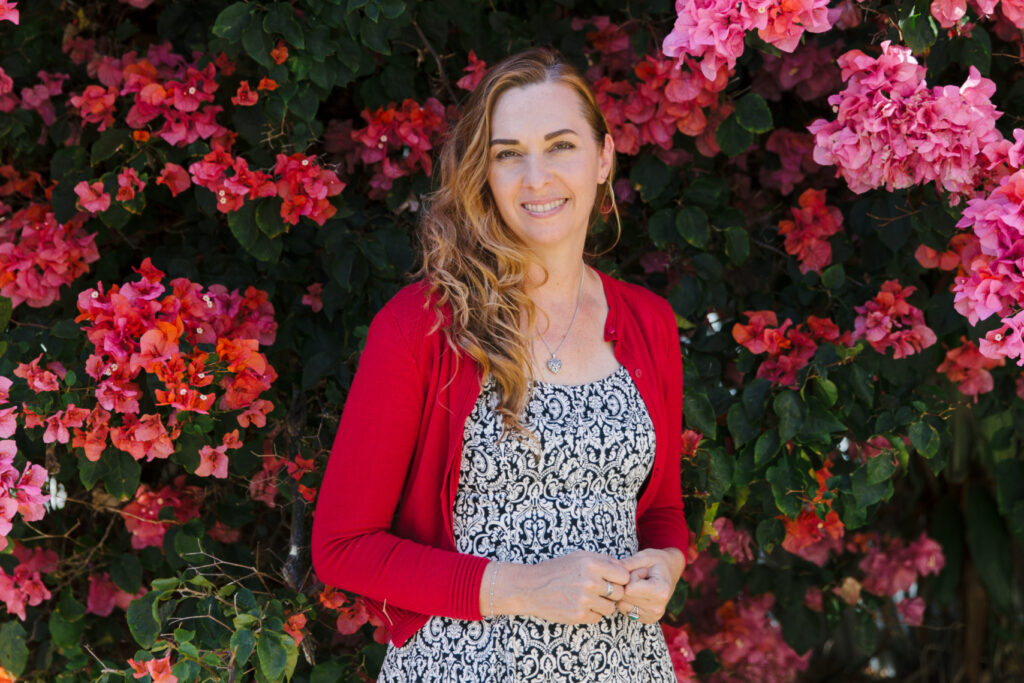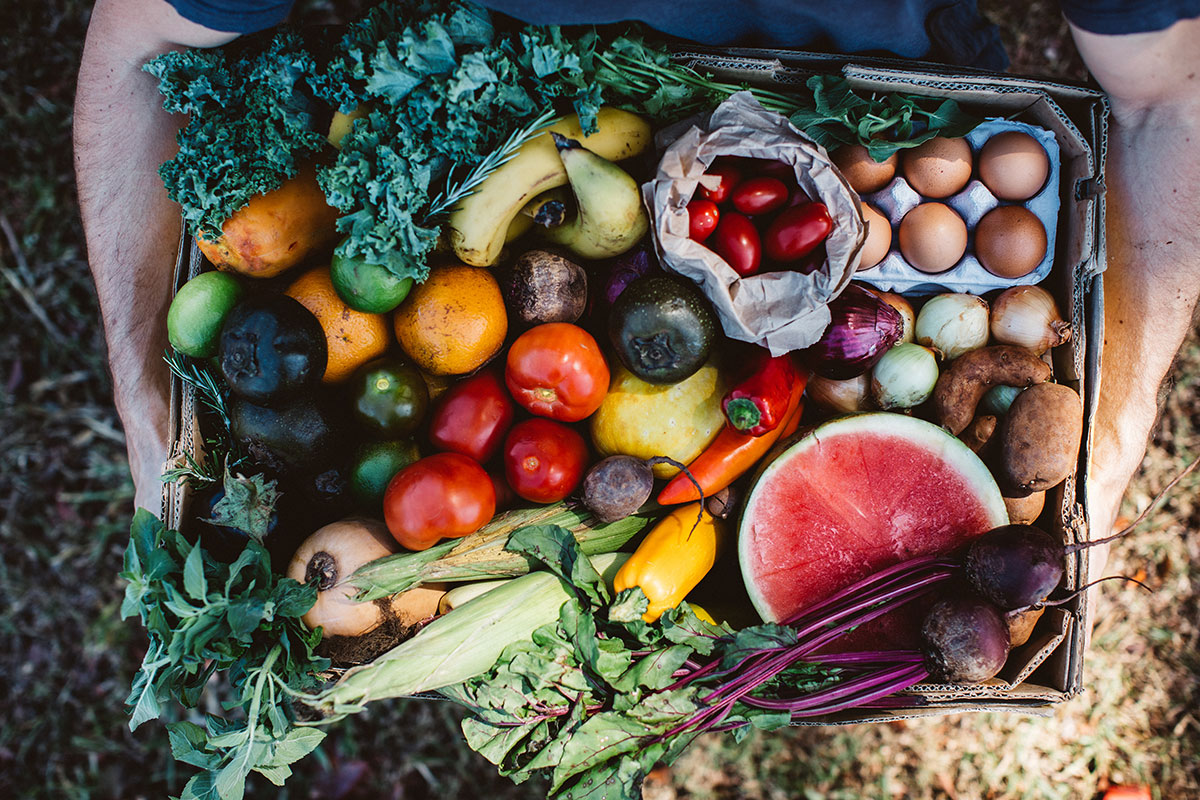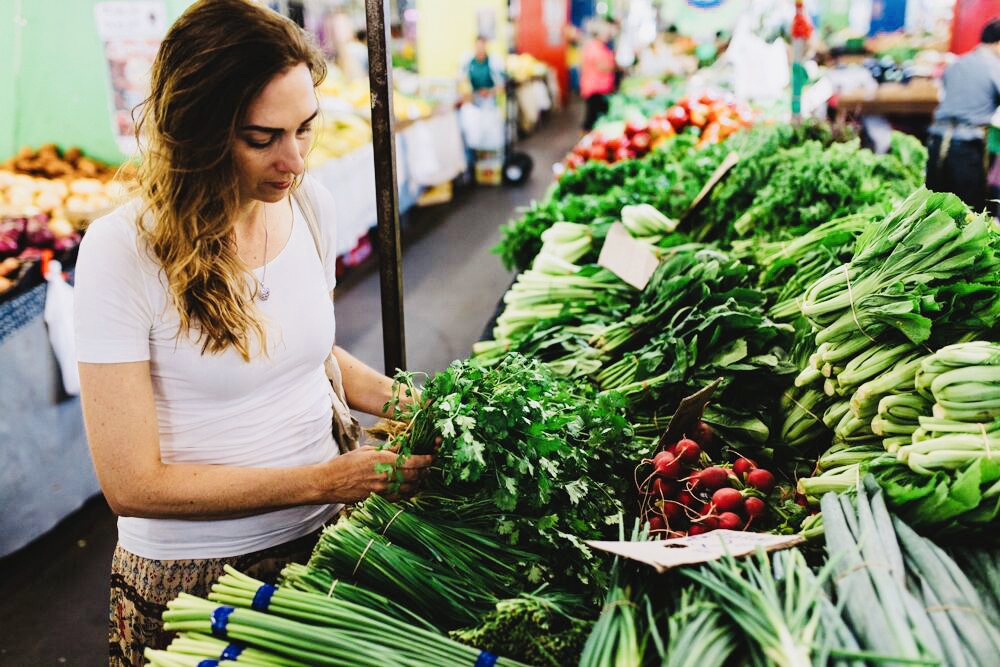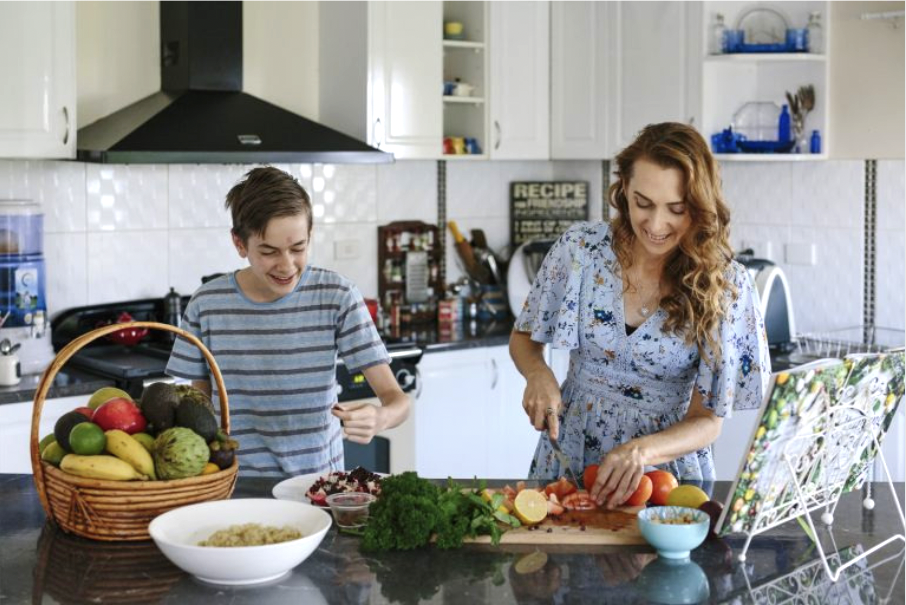No products in the cart.
WHERE TO START?
I think it’s important to know the ‘why’ behind the way you eat and where your diet and lifestyle is taking you – because it IS taking in a direction, either towards or away from your health goals. Are your food choices helping you reach your health goals? As you begin to think about the ‘why’ behind food, and the ‘how’ of reaching your goals, you begin to shape your own ‘food philosophy’. I’d love to share with you my food philosophy – why I eat (and cook) the way I do.
Want to dive deeper into this subject? Listen to my interview with Dr Damian Kristof.
MY FOOD PHILOSOPHY
Whole food
My approach to a healthy diet is built on the principles of whole foods – food that is as close to nature as possible, produced using traditional preparation techniques rather than produced in a laboratory, with a focus on high quality ingredients that are grown without pesticides wherever possible, contributing to the health of the environment rather than having a negative impact on the soil and waterways.
Why whole food?
When we consume food, our aim is to experience and receive nourishment. The most nourishing foods are those as close to their natural state as possible: meat, eggs, seafood, leafy green vegetables, root vegetables, nuts, seeds and fruit. For the longest part of our history as human beings, these are the foods we ate, and it wasn’t until the industrialisation of our food system that we started consuming highly-refined foods in large quantities.
Whole foods contain a natural balance that maximises nutrition, increases satiety and minimises toxicity. A sweet potato, for example, contains sugar that is bundled up with plant fibre. This fibre decreases the rate of sugar absorption, allows for a healthy insulin response and allows us to feel full. The sweet potato also contains many nutrients that our bodies need. If we were to isolate the sugar in the sweet potato and consume this sugar as a fractionated compound, we would lose the blood-sugar control the fibre offers, as well as the remaining nutritional value.
The downside of refined foods
Refined foods are not only detrimental for our health (think inflammation, obesity, poor gut health, heart disease and more…), they are also unsatisfying, because they are not providing the body with the nourishment our cells need, so overeating becomes a big issue. And of course, since we are now consuming these refined foods in much larger quantities than ever, our health suffers greatly.
Refined foods are a dream for a food manufacturer. The high yields of monoculture and corporate farming are producing subsidised crops in huge amounts. Industrial processing such as chemical extraction produce high-profit, shelf-stable products that compete for our dollar. The argument is that we can feed so many more people with this way of farming. Sadly, these pesticide-laden crops and processed foods are detrimental to our health, and the health of the environment.
We pay a heavy price for cheap food; the soil degrades due to continuous pesticide and chemical fertiliser use; small farms are unable to compete; genetically modified foods enter our food chain; and seeds, which were historically stored year after year by generations of crop farmers, now need to be purchased from food technology companies that own the patent to that life form.
We are losing biodiversity. Bees, insects and bacteria that are needed for food to pollinate and grow are dying in great numbers and the soil is degrading. When we consume the foods produced by these unsustainable methods, our money perpetuates this damaging cycle that benefits nothing except short-term profits.
But I’m not a farmer – how can I make a difference??
As Joel Salatin so beautifully shares in this podcast, we can make a difference in these three ways:
- Get in the kitchen! The way back starts with finding your way into the kitchen again, and beginning working with food – smelling food, touching food, developing mastery and skill in handling food. And yes, it might mean you have to not do something else – take the kids three hours to a soccer tournament or something – but at the end of the day, if we don’t return to home-centricity in our food system, we will not have any integrity all the way down to the farm.
Do something yourself to participate in this biological womb we live in. Whether it’s a honeybee hive on a roof, a hanging herb garden on a patio… Even if it’s just an earthworm bed kit under your kitchen sink! Let yourself be touched with the mystery, the awesomeness, of this biological womb we live in.
Find the food treasures in your community. It might be a farmer’s market, it might be a box scheme, a delivery service, it might be a farm stand… there are numerous ways, not just going down to Woolies or Coles. Become a ‘food fossicker’ – find the food treasures in your area!
“What our landscape and food system or foodscape will look like for our grandchildren, will be again, a physical manifestation of the values, decisions, and priorities that we have between now and then.” – Joel Salatin
PRINCIPLES OF A WHOLE FOOD DIET
I know it can be confusing and overwhelming trying to keep up with all the “dos and don’ts” when it comes to healthy eating. We humans like to have a nice, neat list of what to eat and what not to eat for good health… but life isn’t that simple. For one thing, a food may have historically been part of a traditional, healthy diet in its original form, but in its modern ‘supermarket’ form it may be very unhealthy! (For example, dairy in its original form vs dairy in its refined, modern form – read this article from Changing Habits.) And for another thing, a food that is fine for you may create havoc in someone else’s system due to differences in genetics, heredity and constitution, as well as environmental factors that affect gut health and even the amount of stress they have going on in their life! (Read One Man’s Meat is Another Man’s Poison, by Dr Natasha Campbell McBride.)
I find the best way to work out whether a food is healthy is to begin by asking these questions, which relate to basic whole-food principles:
- Is this a natural, living food (from plants or animals) with a cellular structure?
- Has this food been in the human diet for thousands of years, or is it a man-made invention, produced in a factory? Does it have a long ‘history of use’?
- Could this food be grown, raised or made at home, or does it need a laboratory and a science degree to produce it?
- Is this food still very close to its natural form, or has it been refined or fractionated?
- Has this food been grown with chemical fertilisers and pesticides, or coated with non-food products to make it look more appetising and prolong shelf-life, or sprayed with sanitisers before packaging?
- If this is a packaged food, is it made from whole-food ingredients? Does it contain additives, colours, flavours, preservatives, gums and fillers?
These questions will give you an idea of what is a whole food and what isn’t. (Example: Think about the oils you use for cooking and ask yourself the above questions. If you’re not sure how an oil is made, look up the process. Think about history of use, and question how long this particular oil has been in the human diet. That will give you a good idea of whether or not it’s a healthy oil!)
Once you understand what is and isn’t a ‘whole food’, you can begin to explore what works for you in the stage and season of life you are in, and according to your unique genetics and constitution. (This is where a good integrative nutritionist or naturopath comes in handy – they can help you work this out if you’re struggling!)
We may not be able to eat a perfectly whole-food diet all the time – sometimes we just have to do the best we can with what we’ve got – but by keeping these principles in mind we reduce the impact of refined, nutrient-deficient foods in our diet and increase our chances of good health. And by teaching these principles to our children, we train them to think for themselves, and give them the tools they need to eat well for the rest of their lives.
GUT HEALTH
My own journey of healing has made me realise just how important gut health is for our overall health and well-being. (Read our gut-health story here.) Most of us have some symptoms of poor gut health, whether we realise it or not. It’s the downside to living in our modern society, surrounded by toxins, stress, pesticides, antibiotics and processed foods.
Many of the health complaints in our world today can be traced back to what is happening in the gut. Our microbiome, the microorganisms that primarily consist of bacteria living in us and on us, predominantly in our gut, play a key role in many physiological functions to keep us healthy.
Poor gut health may show up as digestive issues such as chronic diarrhoea, constipation, loose stools, gut pain, reflux, IBS, Crohn’s disease, ulcerative colitis or stomach ulcers. It may also show up as something you never realised was related to the gut – food intolerances/allergies, depression, OCD and other mental health issues, behavioural disorders, ear infections, chronic fatigue, glandular fever, autoimmune diseases, insomnia, chronic bed-wetting, brain fog, eczema and other skin, candida, weight issues and even heart failure.
Healing the Gut
The gut must be healed in order to properly address these conditions and food is a great place to start. At Quirky Cooking, I aim to emphasise the importance of gut healing foods and lifestyle factors that help to heal and nourish both body and mind. Everything that we do in our day to day lives affects the state of our Microbiome. Therefore it is also extremely important to work on other areas such as minimising chemicals and toxins, getting restful sleep, reconnecting with nature, getting sunshine exposure, reducing stress and more.
If you are struggling to improve your gut health and need some help, you are welcome to join the 8 week gut health program I run with nutritionist and GAPS practitioner, Elyse Comerford: The Gut Health Formula.
HEALTHY FAMILIES
Health and well-being should be our default state as humans. There are few things more satisfying than walking down the path of restoring health as a family and being happy and healthy. This is not only possible, it’s our birthright.
The journey of returning to health is not always easy, but just know that you are not alone and that the benefits on the other side are completely worth pushing through any challenging times. We’ve been through it in our family and have experienced such wonderful healing outcomes. I believe with a little help, some practical tools and tips, wholesome recipes, and an understanding of the basic principles of a whole food diet, we can all work towards improving the health of our families.
Getting the whole family involved and excited about nutrition and health is something I am really passionate about. It’s never too late to start, and myself and my team are here to help. I’ve created this space for you to make it easier to enjoy real, nourishing foods with your family to truly experience one of the greatest pleasures in life…. Sharing a delicious wholesome meal with those you love.
COMMUNITY
Community and tribe are a deeply ingrained part of our human nature and I wouldn’t be where I am today without our beautiful Quirky Community. There is a well known proverb that says, “If you want to go fast, go alone. If you want to go far, go together.” This is a wonderful representation of the Quirky Cooking community.
Many years ago, I began the Quirky Cooking blog to share recipes and connect with people online. This has blossomed into a wonderful, engaged and supportive global community that I love and am incredibly grateful for. Contribution and collaboration are major aspects of my purpose and I deeply value helping others as well as being part of a collective mission to reclaim health for all.
Benefits of Community
Science is now showing the mental, emotional and physical benefits to health when community and social connection is present. We were designed for meaningful social contact, and as a result, this impacts our mood, our hormones, our brain and gut health, many other physiological functions, and in turn, our overall health.
Many communities, even if not related by blood are seen as extensions of family and I want to welcome you to this one. 🙂
Listen to this podcast on the benefits of community!
Join in the many discussions in the Quirky Cooking community:
Thank you for being a part of the Quirky Cooking community! Jo xx







Have been following you for years now. But it was good to revisit the basics. Sometimes I over think it trying to “get it right” but it really is simple whole non-refined foods that work. Thank you
Hi. Thank you and yes, sometimes we do overthink and forget that simple food can be delicious and nutritious:-). Good luck on your journey.
Once i re register my ac, how do i get quirky recipes on my thermomix
Hi Kegan! My recipes aren’t on cookidoo, you can find them here on my website or you can find them in my books! https://quirkycooking.com.au/product-category/books/